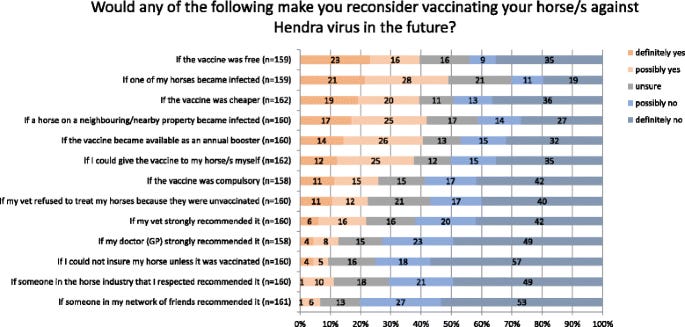Hendra virus and the Lessons for COVID-19 Vaccination
Vaccine mandates can destroy public trust
The best way to analyse a novel disease is through finding a parallel condition and using the template to get a better understanding.
Hendra virus is a rare bat-borne virus where the main viral reservoir is flying-foxes in Australia. It is primarily a disease of horses but can also be transmitted to humans. This virus is from the same family of RNA viruses (paramyxoviridae) that cause measles and mumps.
Middleton, Deborah. "Hendra virus." Veterinary Clinics: Equine Practice 30.3 (2014): 579-589.
The first observation is the timeline of symptoms. In the below description, and infected horse died 2 days after arrival in the paddock. Subsequent infection of 17 other horses in the same vicinity had symptoms 8 to 11 days after the first horse. This timeline is important to observe as similarly in COVID-19, the severe presentations occur at about day 11 after exposure to the virus.
Selvey, Linda A., et al. "Infection of humans and horses by a newly described morbillivirus." Medical Journal of Australia 162.12 (1995): 642-644.
The primary pathology in this disease is a lung vasculitis associated with pulmonary oedema, congestion and consolidation, very similar to that in COVID-19.
The dominant light microscopic lesion in both natural and experimental HeV infection of horses is vasculitis that affects predominantly smaller blood vessels in a wide range of tissues including lung, brain (and meninges), lymphoid tissues, kidney (glomeruli),…
Many horse owners were concerned about the untested characteristics of the Hendra vaccine, and many reported side effects.
Sounds similar to our experience around COVID-19 vaccination.
Manyweathers, J., Field, H., Longnecker, N. et al. “Why won’t they just vaccinate?” Horse owner risk perception and uptake of the Hendra virus vaccine. BMC Vet Res 13, 103 (2017). https://doi.org/10.1186/s12917-017-1006-7
This viral infection seems to be similar to COVID-19, in that the primary mechanism of causing lung damage is through immune dysregulation. It is likely that interferon suppression is a major part of this mechanism.
Similar to COVID-19 vaccines, this injectable vaccine will not be able to prevent infection as there is limited impact on mucosal immunity.
Why is this disease relevant for us to consider at this time?
The challenges were the same around COVID-19 vaccination, and failure to address public concerns has contributed to a loss of trust.
“Increased vaccination uptake could be encouraged by reducing vaccination costs and lowering concerns about the vaccine’s safety and effectiveness. The latter approach is challenging; more time and data may be required to convince a sceptical or distrusting audience. The qualitative and quantitative evidence that veterinarians are not trusted within this discourse is of concern. The need to rebuild and protect good relationships between horse owners and veterinarians should be highlighted as a priority issue, as veterinarians have the most direct and frequent contact with owners, particularly during disease outbreaks. Once lost, trust in veterinarians will be hard to win back.”
Manyweathers, J., Field, H., Longnecker, N. et al. “Why won’t they just vaccinate?” Horse owner risk perception and uptake of the Hendra virus vaccine. BMC Vet Res 13, 103 (2017). https://doi.org/10.1186/s12917-017-1006-7
These public health mistakes could take decades to reverse.






People are always talking about animal viruses while this has been clearly and irrefutably proven to be man-made. Everything started in 1965 and yes the protagonist of this man made virus is: PFIZER. https://www.youtube.com/watch?v=6BRWsLXU7Yg
All viral epidemics have had the same origin for 30 years HUMANS and its pursuit of profit. They even used HIV virusses toe gain the function of this.
What's interesting to me is that horse owners were apparently concerned about vaccines harming their horses and consequently lost confidence in their veterinarians. Meanwhile most people aren't concerned about the COVID vaccines and still have confidence in their sleepwalking doctors.